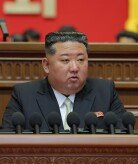[Editorial] A U.S. Line for North Korea
[Editorial] A U.S. Line for North Korea
Posted March. 08, 2007 06:42,
North Korea and the U.S. wrapped up the first round of talks on normalizing relations yesterday and showed satisfaction by and large at the result. North Koreas Vice Foreign Minister Kim Kye Kwan told reporters, "The talk was constructive and serious." His U.S. counterpart, Assistant Secretary of State Christopher Hill, said, I sensed that the North made a strategic decision. The North admitted the necessity of resolving the issue of highly enriched uranium and suggested the establishment of diplomatic ties, skipping the stage of establishing a liaison office. It was an upbeat start and is promising.
Though the first steps the North has to make until April 13 are not that difficult under the February 13 agreement reached at the six-way talks in Beijing, the two parties showed a frankness and seriousness that had been absent before. We hope the next round of talks goes as smoothly as this one so tangible results regarding denuclearization and peace on the Korean peninsula will become a reality. We also should be cautious about key contentious issues.
As for the highly enriched uranium program, the North seemed to make a compromise, but it is not that simple. Even though the North came clean about its centrifuges and other uranium equipment, further progress can be limited because uranium is easier to turn into a nuclear weapon and to be concealed than plutonium, and is not easily traceable.
As for the peace regime, the U.S. prefers a roadmap consisting of completion of denuclearization first, a peace treaty second, and then, finally, U.S.-North Korea diplomatic ties. But the North prefers having a peace treaty first. The U.S. should not give up this stance at all costs.
The worst-case scenario is the possibility that the Bush administration refocuses on the policy of nuclear non-proliferation while tolerating the Norths nuclear program for domestic political reasons. Assistant Secretary Hill emphasized that a prerequisite for establishing diplomatic relations would be for North Korea to abandon its nukes, but he also told reporters in a few interviews, North Korea should not cross the line of transferring nuclear materials to other countries or groups, a remark that cast a question on whether there has been a retreat in principle from zero tolerance of the Norths nukes to zero tolerance of transfers of the Norths nukes.
The security of the U.S. is not threatened as long as the nation is not attacked by North Korean missiles or North Korean nuclear materials are not smuggled to other countries or organizations. But this is not true for South Korea. A nuclear capable North Korea is detrimental to people in the South. Furthermore, depending on the result of the talks, the South will be burdened to provide aid, including a light water reactor, to the North. The major premise of peace is a denuclearized Korean peninsula. The redline for the North not to cross should be possession of nukes. If this principle recedes, there will be no real peace for the South.






![한그릇 1만5000원 봄동비빔밥 ‘품절’…제2의 두쫀쿠?[요즘소비]](https://dimg.donga.com/c/138/175/90/1/wps/NEWS/IMAGE/2026/02/27/133437451.3.jpg)
